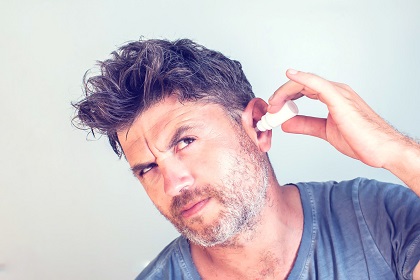Search
Related Articles
Do you hear a ringing, roaring, clicking, or hissing sound in your ears? Do you hear this sound often or all the time? Does the sound bother you a lot? If you answer yes to these questions, you may have tinnitus.
Tinnitus is a symptom associated with many forms of hearing loss. It can also be a symptom of other health problems.
What causes tinnitus?
• Hearing loss. People with different kinds of hearing loss also have tinnitus
• Loud noise. Too much exposure to loud noise can cause hearing loss and tinnitus
• Medicine. More than 200 medicines can cause tinnitus. If you have tinnitus and you take medicine, ask your doctor or pharmacist whether your medicine could be involved
• Wax or a foreign body in the ear canal
• Other health problems. Allergies, tumors, and problems in the heart and blood vessels, jaws, and neck can cause tinnitus
What should I do if I have tinnitus?
The most important thing you can do is to visit your doctor. Your doctor will try to find out what is causing your tinnitus. He or she can check your hearing and examine your ears to see if the canals are obstructed by wax. Your doctor will also check to see if it is related to blood pressure, kidney function, diet, or allergies. Be sure to bring a list of all your medications and dietary supplements so your doctor can determine whether your tinnitus is related to any medicine you are taking.
To learn more about what is causing your tinnitus, your doctor may refer you to an otolaryngologist, an ear, nose, and throat doctor. He or she will examine your ears and your hearing to try to find out why you have tinnitus. Another hearing professional, an audiologist, can measure your hearing. If you need a hearing aid, an audiologist can fit you with one that meets your needs.
How will the doctor treat my tinnitus?
Although there is no cure for tinnitus, several treatments may give you some relief. Not every treatment works for everyone, so you may need to try several to find the ones that help.
Treatments can include:
• Hearing aids. Many people with tinnitus also have a hearing loss. Wearing a hearing aid makes it easier for some people to hear the sounds they need to hear by making them louder. The better you hear other people talking or the music you like, the less you notice your tinnitus
• Maskers. Maskers are small electronic devices that use sound to make tinnitus less noticeable. Maskers do not make tinnitus go away, but they make the ringing or roaring seem softer. Some people find that maskers hide their tinnitus well enough that they can barely hear it. Some people sleep better when they use maskers. Listening to static at a low volume on the radio or using bedside maskers can help. These are devices you can put by your bed instead of behind your ear. They can help you ignore your tinnitus and fall asleep
• Medicine. Some medicines may ease tinnitus. If your doctor prescribes medicine to treat your tinnitus, he or she can tell you whether the medicine has any side effects
• Cognitive therapy. This treatment uses a combination of counseling and maskers. The therapist can help you learn how to deal with your tinnitus better. You may also use maskers to make your tinnitus less noticeable. After a while, some people learn how to avoid thinking about their tinnitus. It takes time for this treatment to work, but it can be very helpful
• Counseling. People with tinnitus may become depressed. Talking with a counselor or people in tinnitus support groups may be helpful
What can I do to help myself?
• If you wear hearing aids, be sure they fit well
• See an otologist (hearing specialist)
• Tinnitus support groups are available online
• Find out more about music therapy for tinnitus
• Acupuncture may be helpful
• Try relaxation techniques, mindfulness and breathing exercises
• Consult a psychologist or neuropsychiatrist
• Consider a white noise generator
• Cognitive behavioral therapy may help
Think about things that will help you cope. Many people find listening to music very helpful. Focusing on music might help you forget about your tinnitus for a while. It can also help mask the sound. Other people like to listen to recorded nature sounds, like ocean waves, the wind, or even crickets.
Avoid anything that can make your tinnitus worse. This includes smoking, alcohol, and loud noise. If you are a construction worker, an airport worker, or a hunter, or if you are regularly exposed to loud noise at home or at work, wear ear plugs or special earmuffs to protect your hearing and keep your tinnitus from getting worse.
If it is hard for you to hear over your tinnitus, ask your friends and family to face you when they talk so you can see their faces. Seeing their expressions may help you understand them better. Ask people to speak louder, but not shout. Also, tell them they do not have to talk slowly, just more clearly.
This document is intended to provide health related information so that you may be better informed. It is not a substitute for your care team's medical advice and should not be relied upon for treatment for specific medical conditions.
© 2017 The General Hospital Corporation.
Primary Care Office lnSite
developed by the MGH Laboratory of Computer Science and Division of General Internal Medicine
Click the link for more information on E.N.T Clinical Service









